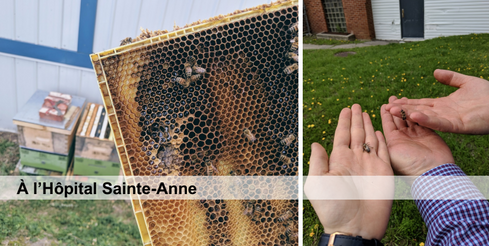Beehives around West Island hospitals an environmental initiative of the CIUSSS.
- Carey Tate

- Aug 28, 2023
- 2 min read
The West Island CIUSSS has been using its hospital grounds to accommodate beehives in the hopes of saving these essential insects. The Lasalle, Lakeshore, Sainte-Anne's, St-Mary's Hospitals, and the Douglas Mental Health Institute are hosting the pollinators on their grounds or rooftops. The project began back in 2019 at St-Mary's Hospital, and its success has allowed it to expand to the other four sites.
PHOTOS: CIUSSS de l'Ouest-de-l'Île
Spearheaded by Michel Perreault, environmental technician of the West Island CIUSSS, he began this project upon understanding the plight of bees in peril due to climate change, pesticides, and habitat loss, among other factors. Yet bees help to produce 30-40% of our food through pollination. Since the rapid development of neonicotinoids (pesticides) in 1995, the bee mortality rate has risen from 5 to 30%. One billion flowers, trees, and vegetables are estimated to have been pollinated by the bees involved in the CIUSSS' project, who can travel around 3 km from the hive.
"As part of the CIUSSS' environmental contributions, I thought we could integrate urban apiculture on hospital sites and help save the bees," explained Perreault

There are 50,000 bees in a colony and 10 colonies between the five hospitals, meaning over 500,000 bees hard at work. One bee colony can produce 30 pounds of honey a year. This precious commodity is the nectar of 2 million flowers per pound. Soap, creams, lip balm, and deodorant have been created using honey through the independent company ApiGuru. Proceeds go towards a green fund to continue to run these initiatives and pay the apiculturists. These products are being sold in hospital cafeterias, and products can be requested and obtained there.
SOURCE: CIUSSS de L'Ouest-de-l'Île















Comments